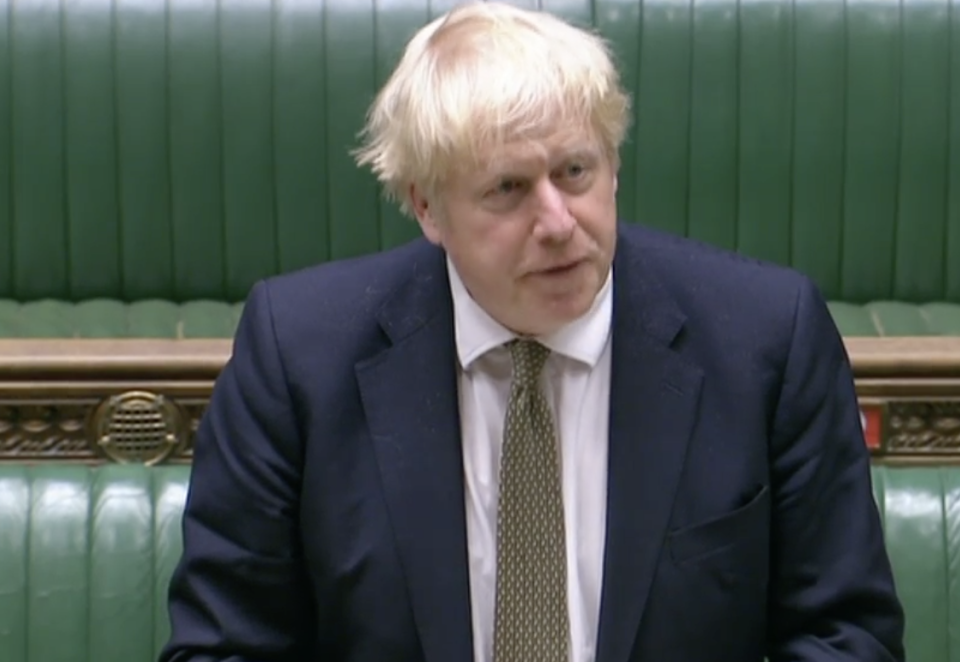Boris Johnson reveals details of three-tier lockdown plan for England
Watch: Boris Johnson sets out new local lockdown system for England
England entering three-tier local lockdown system, Boris Johnson confirms
Areas to face restrictions according to alert levels: “very high”, “high” or “medium”
Liverpool only area to be placed in “very high” category
PM says new system will simplify previous local restrictions
Boris Johnson has confirmed England is entering a three-tier local lockdown system to restrict the second wave of coronavirus infections.
Speaking in the House of Commons on Monday, the prime minister also announced Liverpool will be facing the toughest restrictions.
Setting out the plan, Johnson told MPs: “We need to go further.
“Just as we simplified our national rules with the ‘rule of six’, we will now simplify and standardise our local rules by introducing a three-tiered system of local COVID alert levels.”
Watch: How will England's three-tier local lockdown system work?
Johnson said the levels will be set at “medium”, “high” and “very high”.
Tier 3 – very high
“Very high” is the tier that will apply to Liverpool, which has the country’s highest rate of coronavirus hospitalisations.
Household mixing will be banned indoors and at outdoor gardens and hospitality venues. Meanwhile, pubs will be forced to close unless they can operate as a restaurant.
People will also be advised against travel in and out of these areas.
Johnson also warned further venues, including in the leisure, hospitality and entertainment sectors, could also be closed – but that any decision will be made with local leaders. These would be subject to a four-week “sunset clause”.
Shops, schools and universities will remain open.
Tier 2 – high
Places in the “high” tier will see household mixing banned indoors. However, the “rule of six”, which allows social gatherings of up to six people, will still apply outdoors.
Areas which were previously under local restrictions, such as Greater Manchester and Birmingham, have been placed in the “high” tier.
Tier 1 – medium
“Medium” will apply to most of England and consist of the current national measures.
A postcode checker is set to be launched on the government’s website to advise people what guidance applies to their area.
Johnson concluded: “Though I must warn the house again that the weeks and months ahead will continue to be difficult and will test the mettle of this country, I have no doubt at all that together we will succeed.”
Labour leader Sir Keir Starmer said he was “sceptical” whether Johnson has a plan to control the virus.
He also accused the PM of being “several steps behind the curve”.
Referring to backbench Conservative MPs who have recently rebelled against Johnson over the rule of six and 10pm curfew for pubs and restaurants, Starmer added: “I know that there will be some on his side who will oppose further restrictions, there will be those who look at the data and tell him to disregard it or say the cost of acting now is too high.
“I want to be clear, the worst thing the PM can do is not act quickly and decisively enough, or to keep coming back to this house every couple of weeks with a new plan that doesn’t work and isn’t up to the scale of the task.
“We need to break that cycle, finally get on top of the virus, rebuild public confidence.”
Johnson hit back, telling Starmer to stop “flip flopping” and instead support restrictive measures where necessary.
His announcement came after senior government advisers warned pressure is building on hospitals, with a steep rise in the number of people needing urgent treatment for the virus.

Jonathan Van-Tam, England’s deputy chief medical officer, said at a Downing Street press briefing that a coming rise in COVID hospital admissions and deaths is “baked in” after the recent surge of infections.
NHS England's medical director Prof Stephen Powis announced that Nightingale hospitals in the North of England have been asked to mobilise to deal with an increase in patients.
Prof Powis also said there are more COVID patients in hospital in England now than when the UK went into a full national lockdown on 23 March.
The issues were further laid bare by reports that hospitals in Liverpool have begun scaling back non-urgent care to deal with increased COVID admissions.
Coronavirus: what happened today
Click here to sign up to the latest news and information with our daily Catch-up newsletter

 Yahoo News
Yahoo News 

